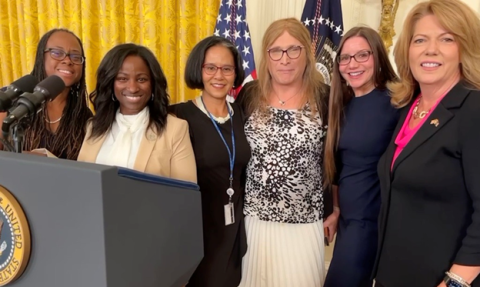By: Maci Morin and Michell Morton, Office of Internet Connectivity and Growth
In today's digital world, access to technology and the Internet enables boundless opportunities. Now more than ever, women and girls are seizing these opportunities to smash barriers and soar to new heights.
For women and girls, achieving digital equity is more than gaining access to the devices and connectivity that empower them – it is also about safeguarding their journey.
As we celebrate International Women's Day, read on for three reasons why digital equity is a game-changer for women and girls’ empowerment.
1. Empowering through Education and Workforce Opportunities
Digital equity ensures equitable access to education and workforce opportunities. By providing women and girls with access to online learning platforms, educational resources, and digital skills training programs, they get the tools they need to thrive in a technology-driven society. This access to education opens doors to diverse career paths, from STEM fields to entrepreneurship, enabling women and girls to challenge the status quo in male-dominated sectors and pursue their aspirations without limitations.
By tapping into these opportunities, women and girls can achieve financial independence, contribute to household incomes, and challenge societal norms that perpetuate gender disparities in the workforce.
The U.S. Department of Commerce’s National Telecommunications and Information Administration (NTIA) supports the development of an inclusive broadband workforce that offers good jobs and opportunities to workers in the U.S., which will advance the goal of achieving digital equity across the country. Successful workforce policy implementation is one lever broadband practitioners can use to build equity into all Internet For All programs.
2. Building Support Networks and Amplifying Voices

From serving as their state broadband office’s first-ever directors to running for public office and more, these women are pioneers in broadband.
From left to right: Tamarah Holmes, Ph.D., Director, Office of Broadband at the Virginia Department of Housing and Community Development; Valarry Bullard, Broadband Director, State of New Jersey; Angela Thi Bennett, Director of Digital Equity, NTIA; Christine Hallquist, Executive Director, Vermont Community Broadband Board; Jade Piros de Carvalho, Director, Office of Broadband Development, Kansas Department of Commerce; and Sally Burchfield Doty, Director, Office of Broadband Expansion and Accessibility of Mississippi. Photo courtesy of Angela Thi Bennett.
Online spaces provide women and girls with platforms to connect, collaborate, and amplify their voices on issues that matter to them. Digital equity ensures that women and girls have a seat at the table and a voice in online discussions, allowing them to advocate for their rights, share their experiences, and mobilize support for social change.
From social media campaigns to online forums and communities, women and girls can build solidarity networks, find mentors, tap into new markets, and access support services tailored to their needs. These efforts are essential in fostering a culture of respect, inclusivity, and empowerment in digital spaces, where women and girls can thrive and express themselves freely without fear of reprisal.
3. Safeguarding Women's Online Journey
Unfortunately, digital technologies can also be used as tools of coercion, control, and violence against women and girls. Digital equity initiatives address this challenge by providing resources, support, and legal protections to survivors of gender-based violence and technology-enabled abuse. From online counseling services to digital evidence collection tools, women and girls have access to a range of resources to seek help and navigate the legal system.
Together with the White House Gender Policy Council (GPC), NTIA recognizes the paramount importance of protecting women and girls as they harness online tools to drive monumental change offline. NTIA’s Digital Equity Act Grant Programs provide funds that U.S. States and Territories can use to support digital equity efforts, which may include the integration of safety measures into digital equity training, skills, devices, etc.
The GPC works in coordination with the other White House policy councils and across all federal agencies to drive a strategic, whole-of-government approach to advance gender equality and gender equity, as part of the implementation of the first-ever National Strategy on Gender Equity and Equality in the U.S.
The GPC spearheads a holistic approach, addressing economic security, health, education, and gender-based violence, with a keen focus on the challenges faced by women and girls. Our collaboration with the GPC focuses on the potential that lies at the intersection of technology applications and safe, equitable access to them for women and girls.
This International Women’s Day, let’s remember that digital equity is not just about access; it's about ensuring a digital future for everyone. By prioritizing digital safety for women and girls, we empower them to continue their progress towards gender equity.
